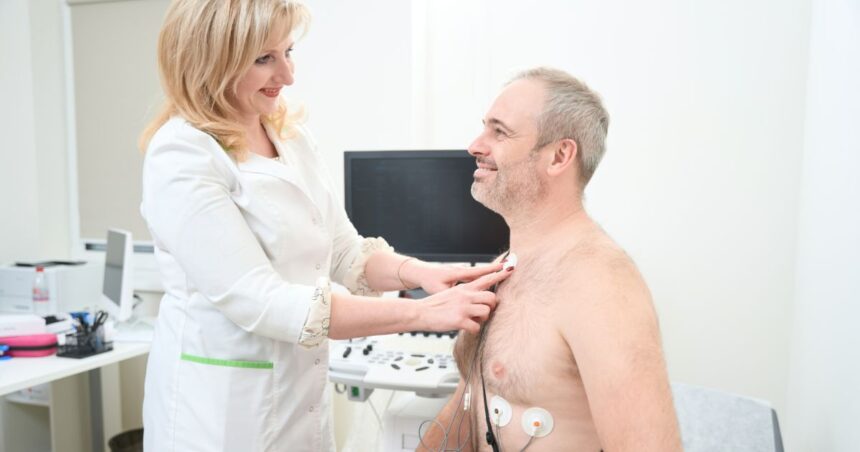Nerve and muscle-related issues can significantly affect daily life, causing discomfort, weakness, or limited mobility. NCV (Nerve Conduction Velocity) and EMG (Electromyography) tests are diagnostic tools that help identify problems in the nerves and muscles.
These tests are essential for diagnosing various conditions and guiding effective treatment plans.
What Are NCV and EMG Tests?
NCV and EMG tests evaluate the health of your nerves and muscles. While they are often performed together, they serve slightly different purposes.
NCV Testing
NCV testing measures how fast electrical signals travel through your nerves. It helps identify nerve damage and pinpoint its location.
- How It Works: Small electrodes are placed on your skin, and a mild electrical impulse is sent through the nerve. The response time is recorded to determine if the nerve is functioning properly.
- What It Detects: Conditions like carpal tunnel syndrome, nerve compression, and peripheral neuropathy.
EMG Testing
EMG testing evaluates the electrical activity in your muscles at rest and during movement. It detects muscle abnormalities and nerve-related issues affecting muscle control.
- How It Works: A thin needle electrode is inserted into the muscle to record electrical activity. The results show whether the muscle is receiving signals from the nerves correctly.
- What It Detects: Conditions like muscular dystrophy, ALS (amyotrophic lateral sclerosis), or radiculopathy (nerve root problems).
Benefits of NCV and EMG Testing
These tests offer significant benefits in diagnosing and managing nerve and muscle conditions.
Early and Accurate Diagnosis
NCV and EMG tests provide precise nerve and muscle health data, allowing doctors to identify problems early. Early detection can prevent the progression of diseases and lead to more effective treatments.
Personalized Treatment Plans
The results help doctors tailor treatments to your needs, such as physical therapy, medications, or lifestyle changes.
Non-Invasive and Minimal Discomfort
NCV is non-invasive, while EMG involves only a small needle insertion. Both tests are generally well-tolerated, making them suitable for most patients.
Monitoring Progress
These tests help monitor progress and adjust therapies as needed for patients already receiving treatment.
Risks of NCV and EMG Testing
While NCV and EMG tests are generally safe, they have minor risks and considerations.
Mild Discomfort
- NCV: Some people may feel a tingling or slight shock during the test. This is brief and not harmful.
- EMG: The needle insertion can cause minor discomfort or soreness at the site. The sensation is usually short-lived.
Rare Side Effects
- EMG: In rare cases, the needle site may have slight bruising or swelling. Infection is extremely rare but possible.
- NCV: No significant side effects are associated with NCV testing.
Anxiety About the Procedure
Some patients may feel anxious about the electrical impulses or needles. Relaxation techniques like deep breathing can help ease nerves during the tests.
Who Needs NCV and EMG Testing?
Doctors may recommend these tests for patients experiencing symptoms such as:
- Persistent numbness or tingling
- Muscle weakness or cramping
- Unexplained pain in the limbs
- Difficulty moving or maintaining balance
These symptoms could indicate conditions like:
- Nerve Damage: Carpal tunnel syndrome or peripheral neuropathy.
- Muscle Disorders: Muscular dystrophy or polymyositis.
- Spinal Issues: Herniated discs or radiculopathy.
If you experience these symptoms, consult your doctor to determine if NCV and EMG tests are appropriate.
How to Prepare for NCV and EMG Tests
Preparation for these tests is simple and straightforward.
- Wear Comfortable Clothing: Loose clothes make it easier to access the test area.
- Avoid Lotions or Oils: These can interfere with electrode placement.
- Inform Your Doctor: Share details about medications you’re taking, as some may affect test results.
Your doctor will provide specific instructions based on your medical history.
Conclusion
NCV and EMG tests are powerful diagnostic tools for nerve and muscle-related conditions. They offer early detection, accurate diagnoses, and personalized treatment plans, making them invaluable in managing many health issues. While the tests have minor discomfort, their benefits far outweigh the risks.
If you’re experiencing unexplained pain, weakness, or other symptoms, talk to your doctor about whether NCV and EMG tests are right for you. Early diagnosis can lead to better outcomes and improved quality of life.

